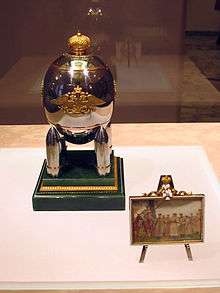Steel Military
| Steel Military Fabergé egg | |
|---|---|
 | |
| Year delivered | 1916 |
| Customer | Alexandra Fyodorovna |
| Current owner | |
| Individual or institution | Kremlin Armoury |
| Design and materials | |
| Workmaster | Henrik Wigström |
The Steel Military Egg is one of a series of fifty-two Russian jewelled Easter eggs made by Alma Pihl under the supervision of the Russian jeweller Peter Carl Fabergé in 1916, for the last Tsar of Russia, Nicholas II. Tsar Nicholas presented the egg as an Easter gift to his wife, the Tsaritsa Alexandra Fyodorovna. The egg is one of the ten Imperial eggs that were never sold, and can now be found in the Kremlin armoury.
Craftsmanship
The exterior of the egg is made from gold, steel, and is coated in vitreous enamel, while the interior is made of silk and velvet. The egg stands on a base of jade. Four steel artillery shells support the egg. The surprise is a miniature painting by Vassily Zuiev on an easel made of gold and steel. The easel is coated in vitreous enamel. The frame of the painting is lined with diamonds.
In fiction
The Steel Military Egg appears in The Strangelove Gambit, a Nikolai Dante novel by David Bishop.
See also
External links
http://www.wintraecken.nl/mieks/faberge/eggs/1916-Steel-Military-Egg.htm